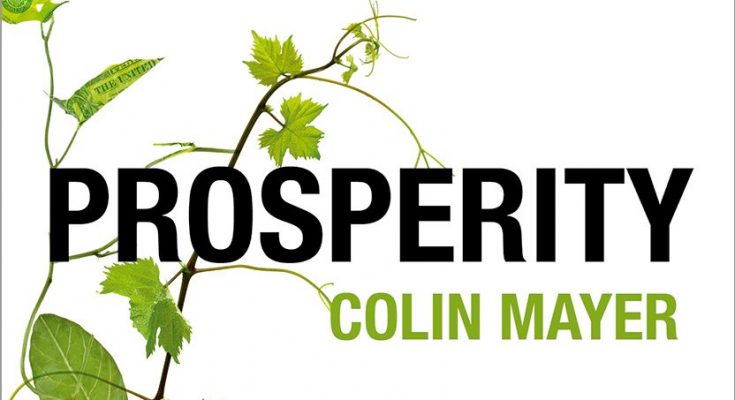Campaigners seeking deep transformation of the economy should look no further for ideas than Colin Mayer’s book, Prosperity. Within it they will find a surprisingly radical agenda even if they will have to work out how to deliver it.
Review by Henry Leveson-Gower
Colin Mayer, a fellow of the elite British Academy and an Oxford professor, is not an obvious revolutionary. Indeed the public event last autumn to highlight progress in his British Academy project, “The Future of the Corporation”, was very much a gathering of the good and the great – at least on the platform.
The only exception to the esteemed academics and scions of business giving of their wisdom, was a representative of the Trades Union Congress. Certainly there were no climate change campaigners on the podium. This did not go by without comment.
However the ideas in his book are potentially revolutionary. He goes well beyond the now regular criticisms of short-term investor dominance and demands for patient investors with broader purposes than profit.
He points out that having broader purposes will make no fundamental difference while investor interests are dominant. Ultimately, environmental and other purposes will be ditched in favour of financial returns. Even Unilever’s once renowned, now recently departed chief, Paul Polman ended up a victim of a shareholder rebellion.
Mayer has a much more ambitious agenda. He wants to reinvent corporations to enable them to deliver true public benefit. He argues that to bring such benefit, corporations must have purposes that are in the public interest and (here’s the radical bit) their governance must then follow from those purposes.
This clearly would fundamentally change the nature of corporate governance which is currently conceived as all about ensuring that management acts in the interest of the members – effectively the shareholders – of the corporation. With this change, Mayer argues, corporate purposes, currently the stuff of public relations puff, would become real commitments. The beneficiaries of such commitments could hold the corporation accountable to deliver them. So, for example, were it a corporation’s purpose to provide nutritional food, it should define and measure the nutritional content of the food it produces and potentially provide audited reports on its performance.
Mayer proposes that a trust should ensure environmental and social purposes are achieved. This builds on the existence of current trusts that hold a company to its original vision. However as a mechanism, it does seem elitist. It will be interesting to see if civil society groups support it once they have a say.
In Mayer’s world, the public and private realms are blurred. Governments are no longer in continuous conflict with profit-driven corporations to attempt to prevent them despoiling the public realm – a conflict, Mayer says, that governments can never win. Instead corporations are potential partners which at least share common public purposes. So why should this be part of any green New Deal agenda? Any injection of demand into the green economy will not remain there as any macro economist will tell you.
It will flow through wages and purchases into other brown areas of the economy, certainly diluting and potentially overwhelming the benefits of the green economy. So a green New Deal may be a start in the right direction, but more fundamental reform is required to the brown economy too. Mayer’s proposals may deliver just that.
However, some might see Mayer’s vision as naive. He has set out clear policy proposals to deliver it, but what government would ever be able to generate the political support to actually implement those policies? It would clearly involve a huge shift of power from the elite who hold most of the shareholder value, control most of the media, and fund most of the political parties.
Mayer’s book provides little help in answering this question. In his defence, he might say he is not a political campaigner. He certainly isn’t choosing his rallies well. Asking this question may also not be seen as good form in the society of the good and the great.





Great review. I now need to read the book.
At the Inclusivity Project, we are working on an accounting standard for organisations to quantify and standardise their reporting on social contribution. It offers a very different approach to the experiments over the last 20 years or so, opening up the prospects of implementing some of the ideas proposed by Colin Mayer – based solely on this review.